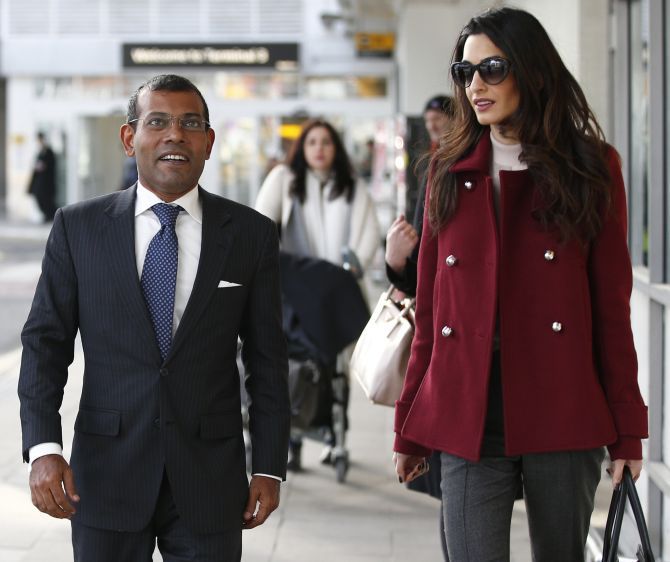 | « Back to article | Print this article |
'I am concerned over Chinese ambitions in the Maldives and wider Indian Ocean,' former Maldives president Mohamed Nasheed tells Rediff.com contributor Rajeev Sharma in an exclusive interview.

The Maldives, which is in India's backyard and a SAARC member, is in the grip of massive political volatility.
On Monday, the Maldivian parliament, the Majlis, witnessed unprecedented scenes with the military dragging out Opposition members, thus allowing President Yameen Abdul Gayoom's government to rig the no-confidence vote.
The United States, the United Kingdom and Canada criticised the rigged voting while the European Union ticked off the Yameen government that parliamentary procedures need to be respected.
India, as usual, kept mum on the ongoing political crisis in the Maldives,
It should be a matter of concern for India that the Maldives, a highly strategic archipelago in the Indian Ocean, is witnessing the rapidly increasing influence of China and Saudi Arabia.
There have been reports of the Saudi royal family and businessmen connected with it trying to buy the Faafu atoll in the Maldives.
Rajeev Sharma spoke to former Maldivian president Mohamed Nasheed, who is currently in Sri Lanka.
Nasheed underlined the adverse strategic fallout of the current political instability in the Maldives for India.
What is the latest situation in the Maldives and how do you, your party and your new allies propose to tackle it?
We witnessed the disgraceful spectacle of the Yameen regime blatantly rigging the vote of no confidence against the speaker of the parliament.
First, the police sealed off parliament and prevented the media, NGOs or the public from witnessing the vote from the public gallery.
Then they tampered with the electronic voting machine which at one point recorded that an MP who is in jail had cast his vote.
Then when Opposition MPs protested, the military dragged them out of parliament one by one.
It is clear that President Yameen will never tolerate any kind of free vote in the Maldives: Whether it's for local council elections, which have been delayed three times now, or whether it's a vote in parliament.
His modus operandi is always the same: Bribe, intimidate and, if all else fails, rig the vote and send in the soldiers.
It's quite apparent that President Yameen is digging in his and not allowing you and the Opposition any room in the Maldives polity.
Have you directly sought intervention of the international community, particularly India, the UN and the West?
I have repeatedly called upon the international community to pressure President Yameen to do two key things: Firstly, stop arresting Opposition MPs and activists on spurious grounds, and secondly, allow free and fair elections, whether it is a vote in parliament, the local council elections or presidential polls.
If the international community cannot ensure President Yameen relents on these key points, I fear the Maldives will continue to remain unstable, and threaten the broader stability of the Indian Ocean.
How, according to you, has President Yameen been emboldened to do what he is doing?
Is he getting overt or covert help from China and Saudi Arabia?
Is the current situation a direct fallout of Saudi Arabian attempts to purchase the Faafu atoll in the Maldives?
A key pledge of our four-party alliance, which we announced last Friday, is to reverse the 2015 constitutional amendment that allows foreigners to buy and own land in the Maldives.
This has opened the door to foreign powers buying parts of the Maldives to further their strategic ambitions.
It has now transpired that President Yameen rammed this amendment through parliament at the secret behest of Saudi Arabia.
Moreover, despite repeated denials by the Maldivian and Saudi governments, we have found out through leaks that members of the Saudi royal family are attempting to buy one of the 26 atolls that make up the Maldivian landmass.
We view this is a grave threat to our sovereignty and independence.
I am also concerned over Chinese ambitions in the Maldives and wider Indian Ocean.
What are the implications for India of the current flare-up in the Maldives?
I am concerned that if India, and the wider international community, sits back and doesn't pressure President Yameen, he will succeed in rigging elections and undermining the institutions of democracy.
I do not believe this will lead to stability in the Maldives and I do not believe such a situation is in India's strategic interests.
IMAGE: Deposed Maldivian president Mohamed Nasheed at Heathrow airport in London, January 21, 2016, with his lawyer Amal Clooney. Nasheed was granted medical leave from his 13-year jail sentence to have spinal surgery. Photograph: Peter Nicholls/Reuters